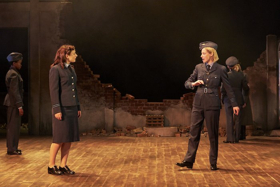Guest Blog: Director Brigid Larmour On All-female MUCH ADO ABOUT NOTHING

in Much Ado About Nothing
Much Ado About Nothing is one of my favourite Shakespeare comedies. It is full of joy, and equal sadness, slipping effortlessly from one to the other - and painfully honest about the complex misunderstandings and betrayals that are often part of love.
I trained at the RSC, and was Assistant Director on a wonderful production of the play - with Derek Jacobi and Sinead Cusack, directed by Terry Hands - which had a life of three years. So the text got under my skin, and into my bloodstream.
As our regulars here at Watford Palace Theatre know, I like to give equal creative opportunities to men and women. This is - at last - becoming less unusual. You may have seen Harriet Walter play Brutus recently, or Glenda Jackson play King Lear; I first cast a female Prospero 25 years ago.
I've also (for entirely practical reasons) done all-female student productions of classical romantic comedies, and found it adds a whole layer of delight and playfulness - and a different kind of observation of our mutual foibles - to the show.
So I decided to do our Much Ado with a company of women. It's a playful riposte to the numerous all-male productions of Shakespeare's - and indeed our own - time. And a wonderful opportunity to give women - including skilled, experienced 'older' women - a chance to play this rich range of parts.
%20Richard%20Lakos.jpg)
Emma Lane in Much Ado About Nothing
A few years ago I saw a play about Britain's first all-female theatre company. I had an instinct this might be a way in to Much Ado. Researching it at the V&A Theatre Museum, I was surprised to find the company was founded as long ago as 1923.
A remarkable eccentric called Nancy Hewins got involved in theatre as a student at Oxford, and became Britain's first female lighting designer. She came from a wealthy family and her mother supported her in setting up what later became the Osiris Players.
A company of seven women lived, worked and toured together. They used a Rolls-Royce - so reliable! - and made their own sets and costumes. The actresses were not paid wages, but had their clothes, shoes, living expenses and doctor's bills paid. Nancy claimed women were the most reliable actors willing to do the work on these terms.
So I became drawn to the idea of setting the play during the Second World War. It theoretically takes place in Messina, Sicily, but everything about it actually suggests an English country house party. The play opens with a group of men returning from a life-or-death battle, to a household of women.
This went on in places all around Watford during the Battle of Britain, when men from diverse backgrounds - including Poland and the West Indies - came down from fierce dogfights in the air to a beautiful English summer. We filmed our trailer at Bentley Priory Museum, a country house four miles from Watford, which was where the RAF Fighter Command was based from 1936 to 1968.
%20and%20Nyla%20Levy%20(Hero)%2C%20Emily%20Tucker%20(Beatrice)%20(c)%20Richard%20Lakos.jpg)
Tucker in Much Ado About Nothing
It is a commonplace that there is additional tension in relationships between men and women in times of war, with the men risking so much, and needing to believe in - perhaps idealising - the women left behind, and being strongly attached to their own honour code. I thought this could help us make sense of the extreme treatment of Hero in the story.
I also thought this context might give our audiences a good way in to our all-female production, as the War was a time when women played a lot of what had traditionally been male roles. We could celebrate the extraordinary women of my mother's generation, and their contribution, alongside their men, to the defeat of fascism.
It also gives a powerful resonance to the play in the time of #MeToo and #Kavanaugh. We see a young girl slut-shamed by a group of powerful older men, on her wedding day, in the church - and her father does not believe her.
But rather than simply re-enact this in the rehearsal room with the same dynamic, with most of the text carried by the experienced older male actors, and relatively few choices available to the young girl, we see this story told by a company of women. It gives us a new perspective, and perhaps prevents us from feeling this kind of thing is 'normal'.
Much Ado About Nothing at Watford Palace Theatre until 27 October
Photo credit: Richard Lakos
Comments

Videos

